Fermented pickles and vinegar pickles offer distinctly different experiences in both taste and health benefits. You'll find fermented pickles deliver a complex, rounded sourness that develops over weeks through natural lacto-fermentation, while vinegar pickles provide an immediate, sharp tang. If you're seeking probiotic benefits, fermented pickles are your best choice, as they contain live beneficial bacteria that support gut health and immunity. Vinegar pickles, though lacking probiotics, are easier to make and offer consistent results with a longer shelf life. Understanding these key differences will help you choose the perfect pickle for your needs.
The History Behind Both Methods
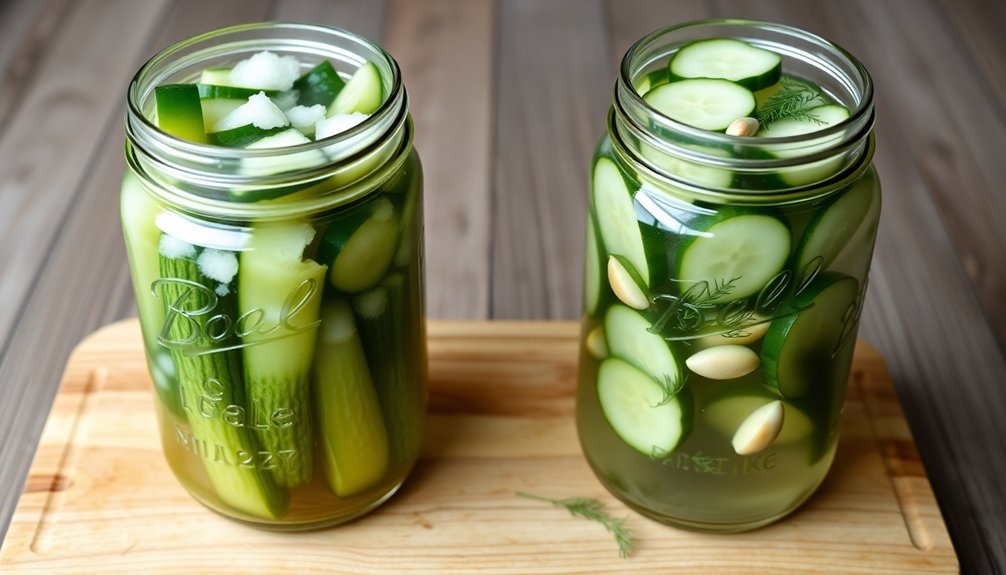
Preservation methods tell a fascinating tale of human ingenuity, with fermented and vinegar pickling emerging from different points in history.
You'll find fermentation's roots stretching back over 6,000 years, with the first cucumber pickles appearing in Mesopotamia's Tigris Valley around 2030 BC. Ancient civilizations, from the Chinese to the Romans, relied on naturally occurring lactic-acid bacteria to preserve their foods.
Vinegar pickling emerged later, with evidence of vinegar production dating to around 3000 BC. The process became more refined during the Middle Ages, particularly with France's Orleans Process, which revolutionized vinegar production. Cleopatra and Julius Caesar were known to favor pickles, believing them to be a source of health and strength.
You'll notice how both methods served different purposes throughout history: fermented pickles were essential for military campaigns and sea voyages, while vinegar-based preservation expanded as vinegar production became more accessible.
The cultural impact of these methods is particularly evident in places like New York City, where Eastern European Jewish immigrants sold fermented pickles from wooden barrels and pushcarts.
While modern technology has changed many food preservation techniques, you'll still find both methods alive today, with fermented pickles remaining especially popular in traditional Jewish delis and cultural cuisines worldwide.
Understanding Preservation Processes
While these preservation methods have rich historical roots, they differ markedly in their underlying processes and techniques.
Fermentation relies on natural microorganisms that produce lactic acid when cucumbers are submerged in salt brine. Using 1/2 cup salt per gallon of water creates the ideal environment for fermentation. You'll need to maintain temperatures between 70ºF-75ºF for 3-4 weeks or 55ºF-65ºF for 5-6 weeks, removing any surface scum regularly to guarantee proper fermentation.
In contrast, vinegar pickling is a quicker process where you'll submerge cucumbers in hot vinegar brine. The acetic acid in vinegar immediately preserves the cucumbers by creating an environment that prevents spoilage, eliminating the need for fermentation. This method typically includes heat processing for sterility.
When it comes to storage, you'll need to refrigerate fermented pickles and maintain them carefully for 4-6 months, or can them for up to a year's shelf life.
Vinegar pickles don't require refrigeration due to their acidic environment. You'll want to monitor fermented pickles for signs of spoilage like softness or sliminess, while vinegar pickles are generally more stable due to their high acid content.
For both methods, proper storage conditions are vital for maintaining quality and safety.
Health Benefits Compared
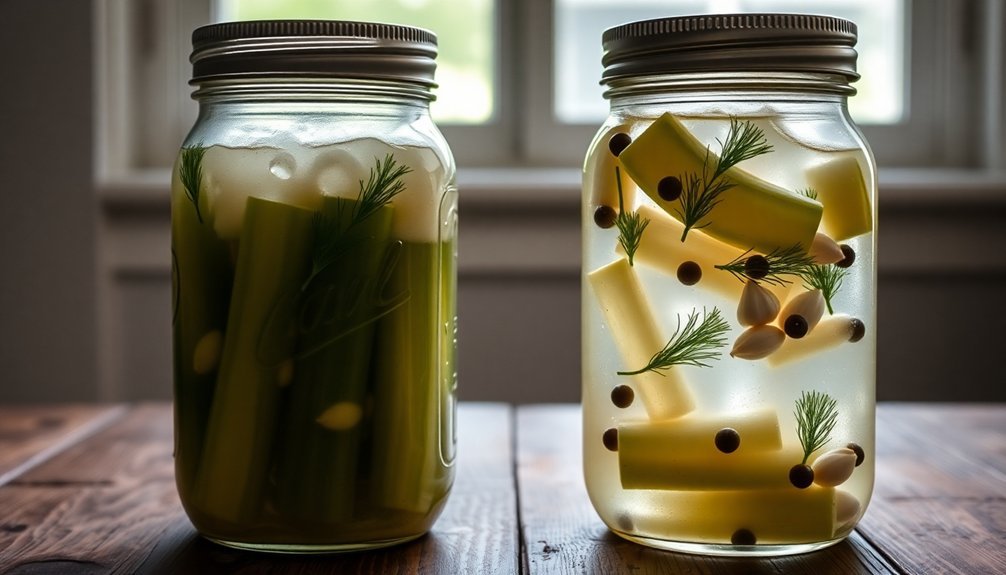
When you're choosing between fermented and vinegar pickles, it's important to know that fermented pickles pack a stronger probiotic punch, actively supporting your digestive system with beneficial bacteria that vinegar pickles don't provide.
Your immune system gets a notable boost from fermented pickles through their diverse array of beneficial compounds and microorganisms, while vinegar pickles offer more limited immune support.
While both varieties contribute to your health, fermented pickles stand out for their ability to enhance your gut microbiome and strengthen your body's natural defense systems. Consuming fermented pickles can help maintain a healthy weight, as probiotics aid weight loss particularly in overweight individuals.
Probiotic Impact on Digestion
Throughout your digestive journey, the choice between fermented and vinegar pickles can greatly impact your gut health. When you consume fermented pickles, you're introducing live beneficial bacteria that actively support your gut microbiome, while vinegar pickles, though easier to digest, lack these probiotic benefits.
You'll find that fermented pickles work harder for your digestive system by restoring and maintaining your natural gut bacteria balance. This balance is essential, as it helps prevent chronic inflammation, reduces disease risk, and can even influence your mental health and weight management.
If you're dealing with digestive issues like IBS, diarrhea, or bloating, the probiotics in fermented pickles can help alleviate these symptoms.
While both pickle types aid digestion, they do so differently. Fermented pickles support long-term digestive health through probiotic action, helping synthesize vitamins and regulate your immune system. You'll find these in the refrigerated section to preserve their live cultures.
Vinegar pickles, though shelf-stable, only assist digestion through their acidic content and enzymes. For best digestive benefits, you'll want to choose fermented pickles over their vinegar-based counterparts.
Immune System Support Benefits
The strength of your immune system depends greatly on your choice between fermented and vinegar pickles. While fermented pickles deliver powerful immune-boosting benefits, vinegar pickles lack these essential properties due to their processing method.
When you consume fermented pickles, you'll get beneficial probiotics that support your gut microbiome, which is vital for immune function. These good bacteria help regulate your immune system, reduce chronic inflammation, and enhance your body's ability to synthesize vitamins and absorb nutrients.
In contrast, vinegar pickles can't offer these benefits because the vinegar kills all microorganisms, including beneficial ones.
Fermented pickles also provide antioxidants like flavonoids and phenols that protect your cells from oxidative stress. They contain unique compounds called alkyl catechols that activate your body's defense pathways against chronic diseases.
These substances work together to shield you from conditions like colorectal cancer and Parkinson's disease while supporting overall immune health.
If you're looking to strengthen your immune system through pickle consumption, you'll want to choose fermented varieties over vinegar-based ones to access these extensive health benefits.
Flavor Development and Taste
You'll notice a stark difference between fermented and vinegar pickles in their flavor complexity, with fermented varieties developing a deep, rounded sourness while vinegar pickles deliver a sharp, immediate tang.
The aging process plays a key role, as fermented pickles evolve over weeks through natural lacto-fermentation, while vinegar pickles achieve their characteristic taste within days.
While both styles offer distinct flavor profiles, fermented pickles tend to develop more nuanced, complex layers of taste compared to their vinegar-based counterparts' straightforward, consistent sourness.
Complex Vs Sharp Tastes
When comparing fermented and vinegar pickles, one of the most striking differences lies in their flavor profiles. You'll notice that fermented pickles offer a more complex and rounded sourness that develops over several weeks through lacto-fermentation. The presence of probiotics contributes to a unique tanginess, while the slow fermentation process creates a deeper, more mellow taste that you won't find in vinegar pickles.
In contrast, you'll find that vinegar pickles deliver a sharper, more immediate tanginess. Since they're preserved in a vinegar solution, you'll experience a consistent and predictable acidity level in every bite. The type of vinegar used in the pickling process greatly influences the final taste – whether it's apple cider vinegar or synthetic vinegar, each brings its own distinctive character to the pickles.
While you can enjoy vinegar pickles much sooner, often within 24 hours of preparation, they lack the complex flavor development that occurs during fermentation. Regional variations add another layer of complexity to fermented pickles, as different cultures incorporate unique spice blends that enhance their distinctive taste profiles.
Evolution During Aging Process
Understanding how fermented pickles evolve during aging reveals even more depth to their complex flavor profile. When you start the fermentation process, the flavor begins mild, but natural bacteria gradually transform sugars into lactic acid, creating that distinctive sour taste. You'll notice the sourness intensifies over several weeks as beneficial bacteria multiply and enhance both flavor and nutritional content.
| Stage | Flavor Profile | Texture Changes |
|---|---|---|
| Initial | Mild, slightly salty | Crisp and firm |
| Mid-Process | Developing sourness | Maintaining crunch |
| Mature | Complex, full sour | Slightly softer |
During aging, you'll see bubbles forming in the brine as CO2 is produced, while the pH continues to drop, creating the perfect preservation environment. The process doesn't just affect taste – it's actively increasing B-vitamins and making nutrients more bioavailable. Once you've reached your desired sourness level, refrigeration at 38-45°F will stabilize the flavor and slow down the softening process. You can expect your properly stored fermented pickles to maintain their quality for up to three months, though each batch will develop its own unique character based on the natural microbial environment.
Depth of Flavor Profile
Three distinct characteristics set fermented and vinegar pickles apart in their flavor profiles. First, you'll notice that fermented pickles develop a complex, rounded sourness through bacterial action, while vinegar pickles deliver a sharp, immediate tanginess from their acidic brine. This fundamental difference creates two entirely distinct taste experiences.
Second, you'll find that fermented pickles offer a more nuanced depth of flavor that evolves over time. The beneficial bacteria continue to work, creating dynamic taste profiles that incorporate herbs and spices more thoroughly into the final product. In contrast, vinegar pickles maintain a consistent, predictable flavor that's established quickly and remains stable.
Third, the seasonal variations play a bigger role in fermented pickles, where you'll taste subtle differences based on the vegetables' natural sugars and growing conditions. The probiotic activity highlights these natural flavors more effectively than vinegar pickling, where the strong acidic brine tends to dominate.
You'll also notice that added spices and herbs integrate more naturally in fermented pickles, while in vinegar pickles, these flavors remain more distinct and separate from the vegetable's inherent taste.
Time and Equipment Requirements
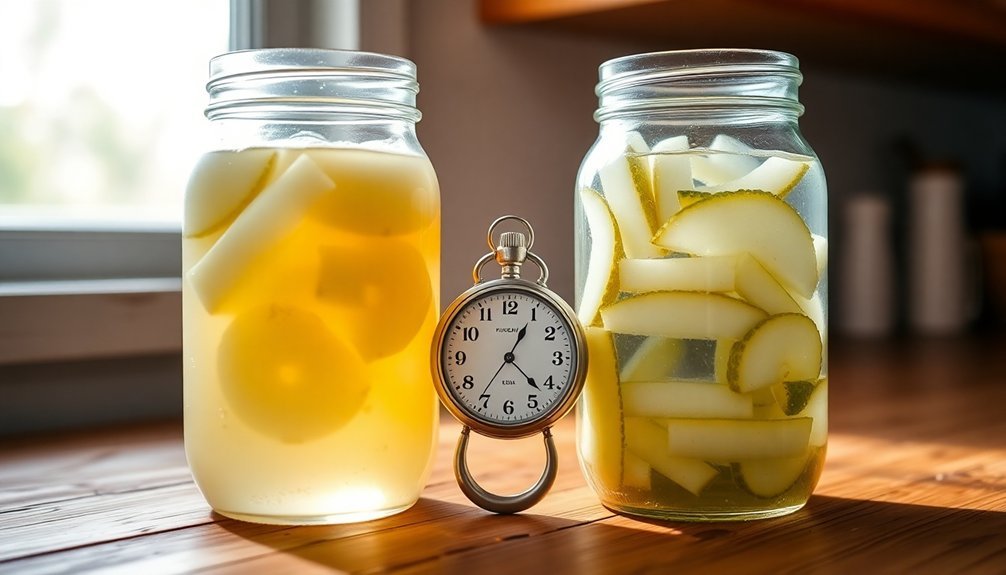
Setting up for pickle fermentation calls for both patience and proper equipment.
You'll need wide-mouth jars with specialty fermenting lids or airlocks to release gases while keeping air out. Sterilized containers, fermentation weights, and basic tools like sharp knives and jar funnels are essential for success.
The time investment varies greatly between fermented and vinegar pickles. While fermented pickles require 5-8 days at room temperature for a half-sour stage, you can extend fermentation up to several weeks for full-sour results.
Daily monitoring is vital to check for bubbling and taste development.
When you're ready to start fermenting, here's what you can expect:
- Your patience will be tested during the 5-8 day waiting period, but the complex flavors are worth it.
- You'll become intimately familiar with your pickles through daily monitoring.
- Your creativity will shine as you experiment with different fermentation times.
- You'll feel accomplished mastering this ancient preservation technique.
Once fermented, your pickles can last up to three months in the refrigerator.
Remember to keep them away from direct sunlight and maintain proper storage conditions to preserve their quality.
Safety Guidelines and Best Practices
While mastering fermentation timing builds confidence, following proper safety protocols determines whether your pickles will be safe to eat.
You'll need to guarantee your fermented vegetables achieve and maintain a pH of 4.6 or lower to prevent dangerous pathogens from growing. For ready-to-eat products, aim for a pH below 4.4 to guard against Listeria monocytogenes.
If you're making vinegar pickles, don't alter tested recipes' proportions of vinegar, water, and vegetables, as these ratios are vital for safety.
For fermented pickles, you'll need to monitor the process carefully, checking for mold and guaranteeing uniform acidity throughout the product. Be aware that acid-tolerant pathogens like E. coli can survive in short fermentation periods.
You should refrigerate opened fermented pickles, as they contain live cultures that can lead to spoilage at room temperature.
Consider pasteurizing your fermented products before repackaging them for longer-term storage. If you're selling your pickles, include clear storage instructions on the labels.
When in doubt, stick to tested recipes and avoid experimental modifications that could compromise safety.
Storage and Shelf Life
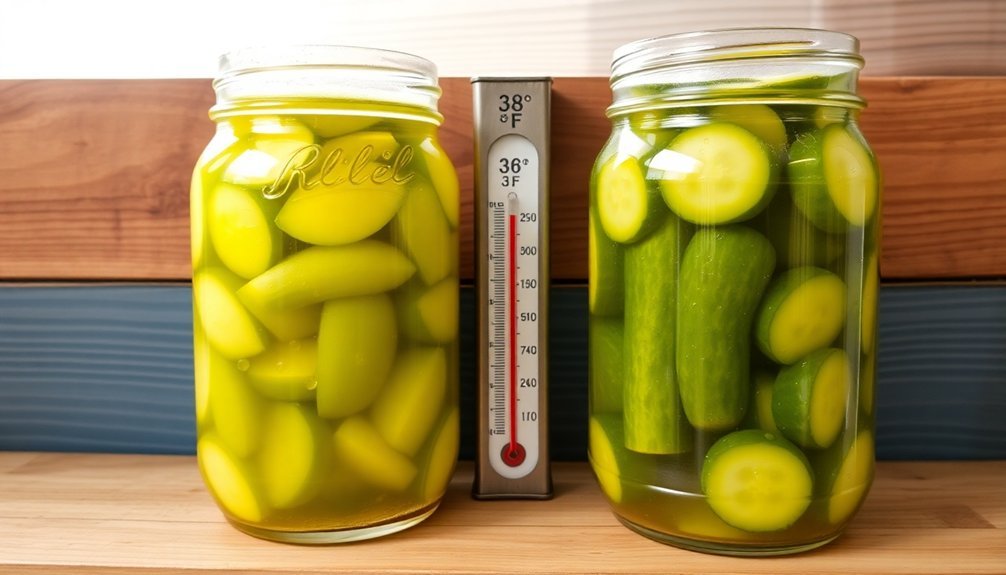
Proper storage of pickles determines whether you'll enjoy them for weeks or months to come. For fermented pickles, you'll need to maintain temperatures between 70-75ºF for 3-4 weeks during the fermentation process, while vinegar pickles don't require this initial step.
After fermentation, both types need specific storage conditions to maintain their quality. Your fermented pickles will last 4-6 months in the refrigerator, or up to a year in a cool, dark place.
Vinegar pickles, when unopened, can last 1-2 years in your pantry, but once opened, they'll keep for 1-3 months in the fridge. You'll know your pickles have spoiled if you notice:
- A soft, slimy texture that feels unpleasant to touch
- An off-putting smell that's different from their usual aroma
- Visible mold growth on the surface
- A bulging lid on store-bought varieties
For both types, maintaining proper storage temperatures is vital. Keep fermented pickles submerged in brine and regularly remove any surface scum.
For vinegar pickles, guarantee tight sealing of jars and store them away from direct sunlight. Refrigeration will greatly extend the shelf life of both varieties once opened.
Choosing Your Pickling Method
Now that you understand how to store your pickles, you'll need to decide which pickling method works best for your needs. Your choice will depend largely on your time constraints, flavor preferences, and health goals.
If you're looking for quick results and immediate flavor control, vinegar pickling is your best option. You'll get crisp, bright-tasting pickles within hours or days, and you can easily adjust the seasonings to your liking. This method is ideal if you're new to pickling or need to prepare something quickly for a gathering.
However, if you value probiotic benefits and complex flavors, consider traditional lacto-fermentation. While you'll need to wait 1-4 weeks for the process to complete, you'll be rewarded with nutrient-rich pickles containing beneficial bacteria. This method also offers more diverse flavor possibilities and preserves more of the vegetable's original nutrients.
Consider your culinary goals too. Vinegar pickles work well in modern recipes and offer consistent results.
Lacto-fermented options connect you to traditional food preservation methods and can be used in various cultural dishes like kimchi and sauerkraut. Choose based on your available time, desired health benefits, and intended use.
Essential Tools and Ingredients
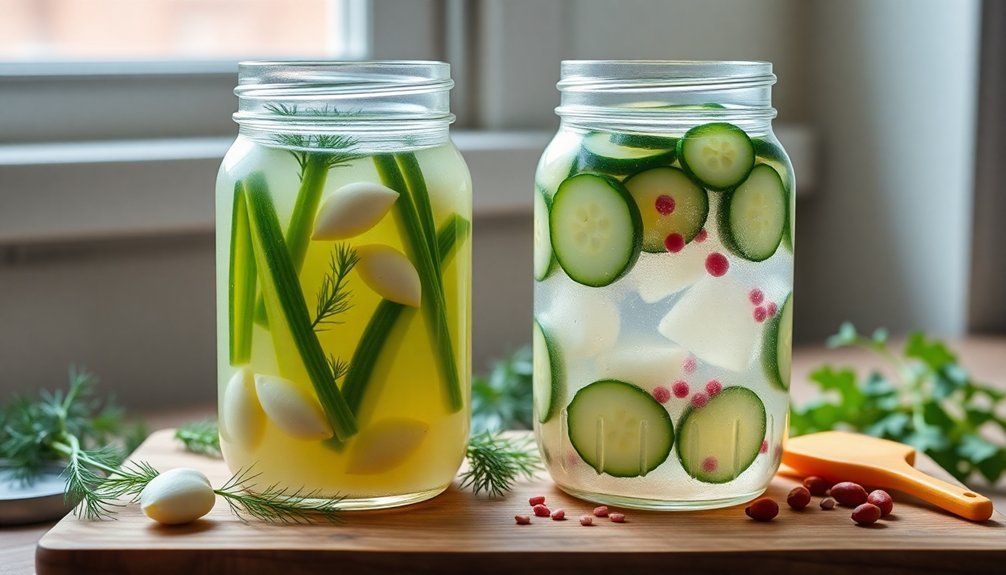
Setting up for successful pickling starts with gathering the right tools and ingredients. Whether you're fermenting or using vinegar, you'll need clean jars, measuring tools, and cutting implements.
For fermented pickles, you'll also want weights to keep cucumbers submerged in brine, while vinegar pickles require precise measurements of acid-to-water ratios.
The ingredient lists differ markedly between methods. Fermented pickles rely on sea salt for a 2-3% brine solution, combined with garlic, mustard seeds, and fresh dill.
Vinegar pickles require 5% acetic acid vinegar, pickling salt, and can include sugar for balance. Both methods benefit from additional spices and tannic acid sources to maintain crispness.
- Feel the satisfaction of watching your cucumbers transform as they ferment naturally in salt brine
- Experience the immediate gratification of vinegar pickling's quick results
- Discover the joy of crafting your own signature pickle blend with various spices
- Take pride in mastering both traditional and modern preservation methods
Remember to choose fresh, firm cucumbers and prepare an ice bath for pre-soaking to guarantee the crispiest results.
Frequently Asked Questions
Can I Mix Both Fermentation and Vinegar Methods in One Batch?
You can mix both methods, but be careful with vinegar amounts. If you use too much, it'll stop fermentation. Small amounts can work, though you'll get fewer probiotic benefits than traditional fermentation alone.
What Vegetables Are Unsuitable for Fermented or Vinegar Pickling?
You shouldn't pickle vegetables that are too watery (like tomatoes), starchy (like potatoes), delicate (like leafy greens), or strongly flavored (like Brussels sprouts). Also avoid mushrooms and eggplants for vinegar pickling.
Why Do My Homemade Pickles Turn Out Softer Than Store-Bought Ones?
Your pickles may be soft because you're not removing blossom ends, using overripe cucumbers, or skipping tannins like grape leaves. Store-bought pickles often contain calcium chloride, which adds extra crunchiness.
Can I Reuse the Brine From Previous Batches of Pickles?
You can safely reuse pickle brine for refrigerator pickles once or twice, but never for canning. Add fresh vinegar to maintain flavor, and always store your reused-brine pickles in the fridge for safety.
What Causes Pickles to Develop a Metallic Taste?
Your pickles can develop a metallic taste if you're using metal utensils, hard water with high mineral content, or low-quality spices. Using improper equipment or letting metals react with pickling acid causes this issue.
In Summary
Whether you choose fermented or vinegar pickles, you'll find unique rewards with each method. Fermentation offers probiotic benefits and complex flavors but requires more patience, while vinegar pickling delivers quick results and reliable preservation. Consider your time, equipment, and taste preferences when deciding. Both methods can transform ordinary vegetables into delicious preserved foods that you'll enjoy throughout the year.


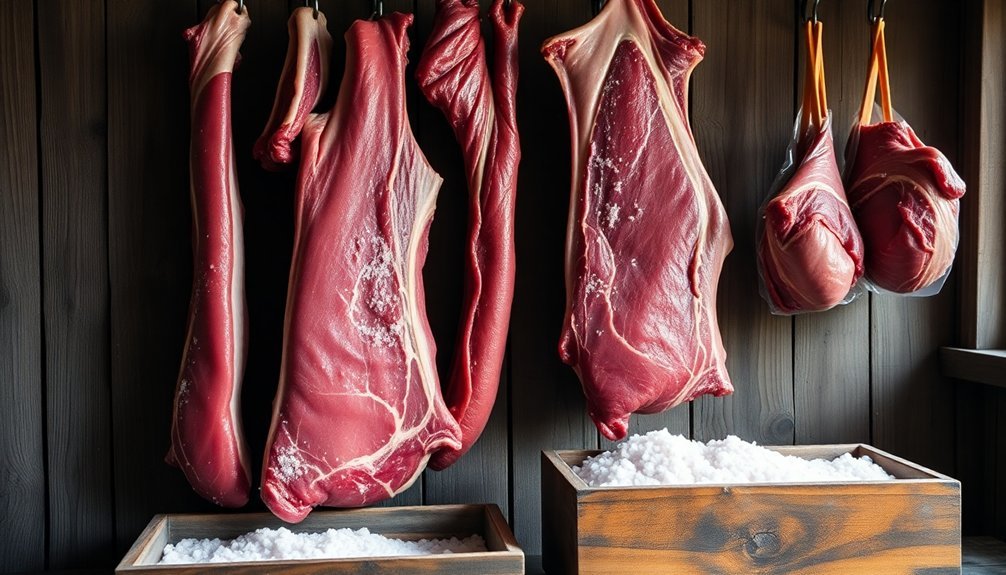
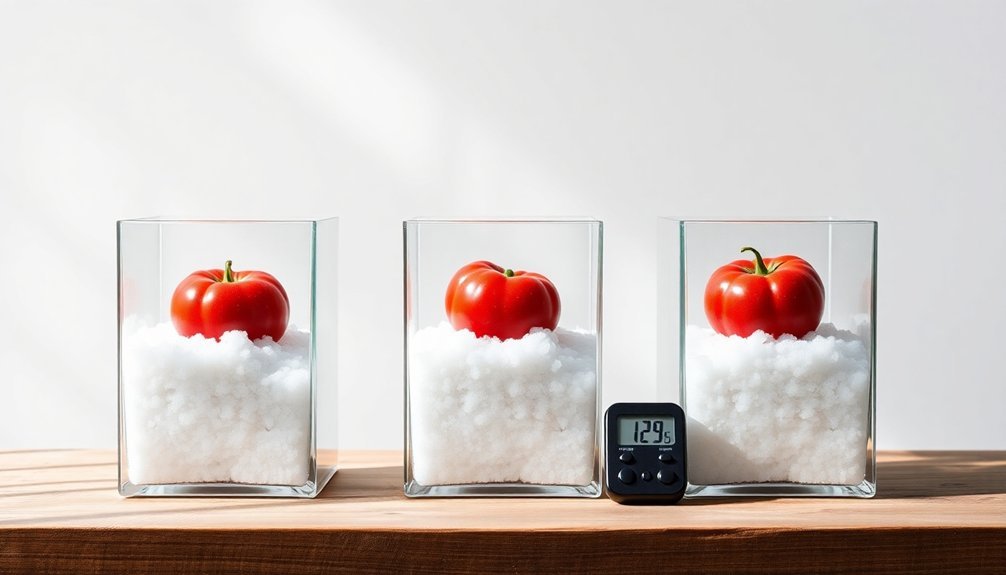
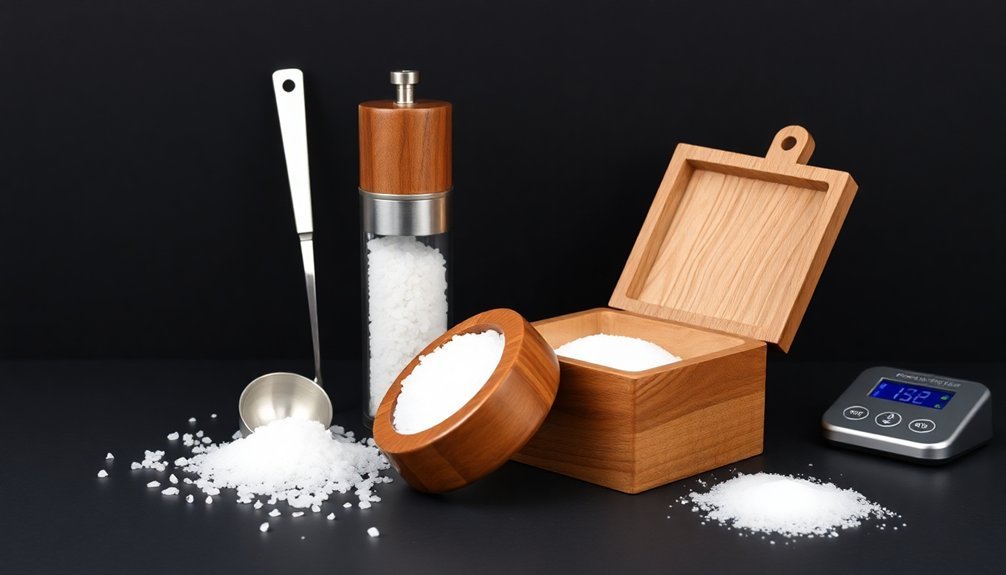
Leave a Reply